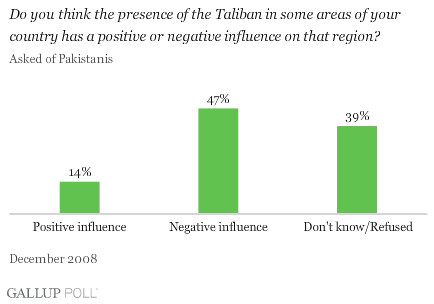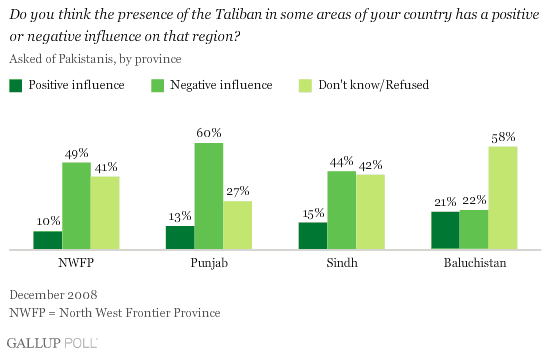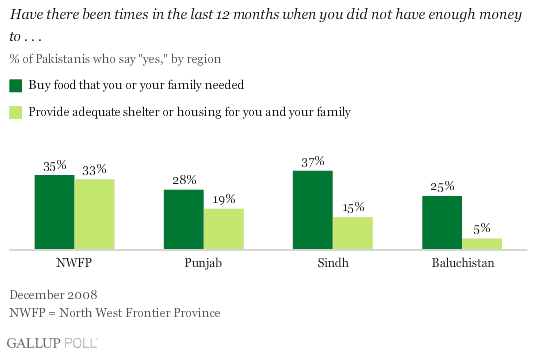WASHINGTON, D.C. -- Although Pakistan's major offensive against Taliban insurgents has displaced more than half a million Pakistanis, Gallup data suggest the government may have some popular support for its actions. A Gallup Poll conducted in December, well before the current military operation, found nearly half of Pakistanis (47%) believed the Taliban's presence in some areas of the country has a negative influence; 14% said it has a positive influence and 39% had no opinion.

Pakistan's government launched a full-scale offensive last week to drive out Taliban militants in the Swat valley and other districts in the country's North West Frontier Province (NWFP). The military operation comes on the heels of the failure of a controversial peace deal and the Taliban's expansion closer to the capital Islamabad.
In the NWFP, where a resurging Taliban has used often-brutal tactics to extend its control in the last year and to make a major push in the last few months, roughly half of residents (49%) told Gallup in December that the presence of the Taliban has a negative influence. While only 10% in this province said the Taliban had a positive influence, 41% said they did not know or would not say.

Sizable percentages in the Sindh (44%) and Punjab (60%) provinces also saw the Taliban's influence as negative. However, the picture looked different in the province of Baluchistan, where some fear the Taliban will flee during the military operation. Here, similar percentages said the Taliban's influence is positive (21%) as said its influence is negative (22%) and the highest percentage of any region (58%) said they did not know or would not say.
Humanitarian Implications
Relief agencies estimate that the number of Pakistanis fleeing the Swat valley and nearby districts could soon swell to as many as 1 million, further inflating the number who have been displaced since last August. This mass exodus poses a humanitarian crisis in a country where many are already struggling to provide the basics: More than 3 in 10 Pakistanis told Gallup that there had been times when they could not afford food for their families in the last year and nearly 2 in 10 said they had been unable to buy adequate shelter. In NWFP, roughly a third of residents said they were unable to afford food or shelter at times.

Bottom Line
Although much has changed in Pakistan since the Gallup survey, with a troubled economy and many Pakistanis struggling to afford food and shelter even before this crisis, any popular support for the offensive could hinge on how Pakistan handles the internal refugee situation. In the event that the military offensive successfully drives out the Taliban, what the government does then will be nearly as crucial to Pakistan's future as the military operation. Displaced Pakistanis who escaped the fighting will need help with rebuilding their homes, schools, and businesses when and if they return home. They will also require some type of assurance that the government will continue to pressure these militants and keep them from returning yet again.
Survey Methods
Results are based face-to-face interviews with approximately 840 adults, aged 15 and older, conducted in December 2008 in Pakistan. The survey did not include the Federally Administered Tribal Areas or Azad Jammu and Kashmir. The excluded area represents about 5% of the population. For results based on the total sample of national adults, one can say with 95% confidence that the maximum margin of sampling error is ±4 percentage points. In addition to sampling error, question wording and practical difficulties in conducting surveys can introduce error or bias into the findings of public opinion polls.
